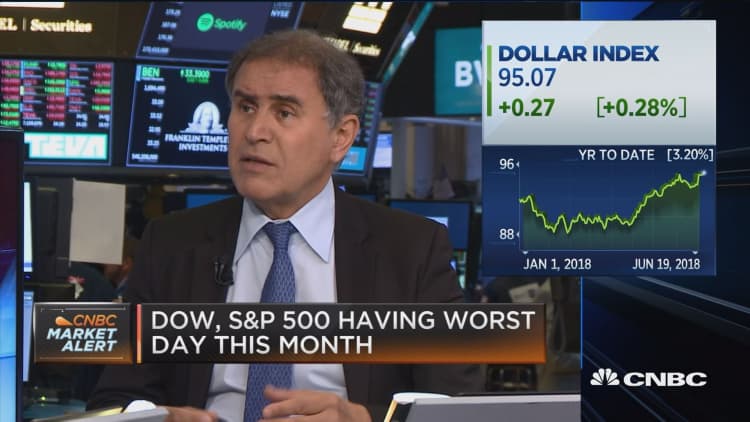
U.S. tariffs on imported goods from China and other parts of the world — and President Donald Trump's generally antagonistic stance with trade partners — is creating risks to the American economy, according to New York University economics professor Nouriel Roubini.
Global economies were growing in sync with each other, and that boosted optimism and business and consumer confidence. But lately that dynamic has begun to break down, with rising interest rates by the Federal Reserve and a possible trade war with China threatening to erode the situation even further, Roubini told CNBC's "Closing Bell" on Tuesday.
He notes that the euro zone slowed first, followed by the U.K. and Japan. "The two key elements of global growth have remained the U.S. and China, and now the U.S. and China are on the verge of a trade war," he said. "There are actually signs of a slowdown of global growth in emerging markets, and the Fed keeps on tightening. So, this is a moment of some degree of fragility."
The U.S. rivalry with China entangles more than just soybeans and electronic components. It's about national security, technology and other issues as the world's two biggest economies square off, he said. "It's going to get worse given this rivalry between the U.S. and China."
Already, Trump threatened to pull the U.S. out of the North American Free Trade Agreement and antagonized key trading partners like Canada, Mexico and the EU by slapping tariffs on their steel and aluminum. Trump says he wants to rebalance what he calls unfair U.S. trade deficits.
But U.S. fiscal policies like massive deficit spending during a period of economic expansion and rising interest rates are the real culprit, Roubini said. A strong dollar only makes the trade imbalance wider, which gives protectionists more ammunition to raise the ante in a spiraling situation.
"The risk is that it actually ends up [turning] into a generalized trade war between the United States and the rest of the world," Roubini said. "But the problem is not that trade practices of the rest of the world are causing these trade deficits. The economic policies of the United States are behind it."
As jobs, employment and wages are all trending positive for Trump, Roubini asked, "Why attack China right now, at a time when the world is becoming more fragile, where the Fed is tightening, where the dollar is rising?" All of it will lead to an economic slowdown that "we don't want, is not desirable and we can't afford."

